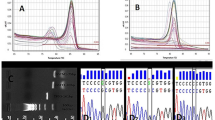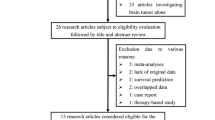Abstract
Polymorphisms in the glutathione S-transferase (GST) genes, a superfamily that plays a key role in carcinogen metabolism, have been associated with an increased susceptibility to several types of cancer. We wished to evaluate whether variant allelic forms of GST isoenzymes were associated with an increased susceptibility for brain tumors and age of tumor onset. Here, we examined 394 brain tumors (221 adult and 173 pediatric cases consisting of 197 astrocytic and 197 non-astrocytic tumors) to determine the frequency of polymorphisms in the GSTM1, GSTT1, and GSTP1 genes compared to a healthy control population. Our data shows that the frequency of GST polymorphisms varies not only between adult and pediatric patients with brain tumors and healthy controls, but also between different histological subtypes of brain tumors occurring in pediatric patients. We found (i) a statistically significant increase in the frequency of the functional GSTM1 allele in high-grade pediatric astrocytomas (p < 0.002), (ii) a significant increase in the frequency of the rare GSTP1 variant Val114/Val114 in pediatric astrocytomas (p < 0.002), and (iii) a significant increase in the frequency of the rare GSTP1 Val114/Val114 genotype among pediatric tumors showing microsatellite instability (MSI) due to defects in mismatch repair (MMR) proteins (p = 0.003). Our results suggest that GSTM1 and GSTP1 polymorphisms may play a role in brain tumor susceptibility by histological subtype, particularly high-grade pediatric astrocytomas. Moreover, the presence of the genetic modifier GSTP1 Val114/Val114 genotype may begin to define a high-risk genotype for cancer susceptibility in the pediatric population.
Similar content being viewed by others
References
Strange RC, Jones PW, Fryer AA: Glutathione S-transferase: genetics and role in toxicology. Tox Let 112–113: 357–363, 2000
Hayes JD, Pulford DJ: The glutathione S-transferase supergene family: regulation of GST and the contribution of the isoenzymes to cancer chemoprotection and drug resistance. Crit Rev Biochem Mol Biol 30: 445–600, 1995
Taningher M, Malacarne D, Izzotti A, Ugolini D, Parodi S: Drug metabolism polymorphisms as modulators of cancer susceptibility. Mutat Res 436: 227–261, 1999
Eaton DL, Bammler TK: Concise review of the glutathione S-transferases and their significance to toxicology. Tox Sci 49: 156–164, 1999
Corrigall AV, Kirsch RE: Glutathione S-transferase distribution and concentration in human organs. Biochem Intrl 16: 443–448, 1988
Ali-Osman F, Akande O, Antoun G, Mao J-X, Buolamwini J: Molecular cloning, characterization, and expression in Escherichia coli of full-length cDNAs of three human glutathione S-transferase Pi gene variants. J Biol Chem 272: 10004–10012, 1997
Zimniak P, Nanduri B, Pikula S, Bandorowicz-Pikula J, Singhal SS, Srivastava SK, Awasthi S, Awasthi YC: Naturally occurring human glutathione S-transferase GSTP1–1 isoforms with isoleucine and valine in position 104 differ in enzymic properties. Eur J Biochem 224: 893–899, 1994
Deakin M, Elder J, Hendrickse C, Peckham D, Baldwin D, Pantin C, Wild N, Leopard P, Bell DA, Jones P, Duncan H, Brannigan K, Alldersea J, Fryer AA, Strange RC: Glutathione S-transferase GSTT1 genotypes and susceptibility to cancer: studies of interactions with GSTM1 in lung, oral, gastric and colorectal cancers. Carcinogenesis 17: 881–884, 1996
Strange RC, Lear JT, Fryer AA: Glutathione S-transferase polymorphisms: influence on susceptibility to cancer. Chem Biol Interact 111–112: 351–364, 1998
Harries LW, Stubbins MJ, Forman D, Howard GCW, Wolf CR: Identification of genetic polymorphisms at the glutathione S-transferase Pi locus and association with susceptibility to bladder, testicular and prostate cancer. Carcinogenesis 18: 641–644, 1997
Ryberg D, Skaug V, Hewer A, Phillips DH, Harries LW, Wolf CR, Ogreid D, Ulvik A, Vu P, Haugen A: Genotypes of glutathione transferase M1 and P1 and their significance for lung DNA adduct levels and cancer risk. Carcinogenesis 18: 1285–1289, 1997
Alonso M, Hamelin R, Kim M, Porwancher K, Sung T, Parhar P, Miller DC, Newcomb EW: Microsatellite instability occurs in distinct subtypes of pediatric but not adult central nervous system tumors. Cancer Res 61: 2124–2128, 2001
Kleihues P and Cavenee WK (eds):World Health Organization Classification of Tumours of the Nervous System, 2000
Soong R, Iacopetta BJ: A rapid and nonisotopic method for screening and sequencing p53 gene mutations in formalin-fixed paraffin-embedded tumors. Mod Pathol 10: 252–258, 1997
Groppi A, Coutelle C, Fleury B, Iron A, Begueret J, Couzigou P: Glutathione S-transferase class mu in French alcoholic cirrhotic patients. Hum Genet 87: 628–630, 1991
Pemble S, Schroeder KR, Spencer SR, Meyer DJ, Hallier E, Bolt HM, Ketterer B, Taylor JB: Human glutathione S-transferase theta (GSTT1): cDNA cloning and the characterization of a genetic polymorphism. Biochem J 300: 271–276, 1994
Harris MJ, Coggan M, Langton L, Wilson SR, Board PG: Polymorphism of the Pi class glutathione S-transferase in normal populations and cancer patients. Pharmacogenetics 8: 27–31, 1998
Lin HJ, Han CY, Bernstein DA, Hsiao W, Lin BK, Hardy S: Ethnic distribution of the glutathione transferase Mu 1–1 (GSTM1) null genotype in 1473 individuals and application to bladder cancer susceptibility. Carcinogenesis 15: 1077–1081, 1994
Nelson HH, Wiencke JK, Christiani DC, Cheng TJ, Zuo ZF, Schwartz BS, Lee BK, Spitz MR, Wang M, Xu X: Ethnic differences in the prevalence of the homozygous deleted genotype of glutathione S-transferase theta. Carcinogenesis 16: 1243–1245, 1995
Watson MA, Stewart RK, Smith GBJ, Massey TE, Bell DA: Human glutathione S-transferase P1 polymorphisms: relationship to lung tissue enzyme activity and population frequency distribution. Carcinogenesis 19: 275–280, 1998
Park JY, Schantz SP, Stern JC, Kaur T, Lazarus P: Association between glutathione S-transferase π genetic polymorphisms and oral cancer risk. Pharmacogenetics 9: 497–504, 1999
Welfare M, Adeokun AM, Bassendine MF, Daly AK: Polymorphisms in GSTP1, GSTM1, and GSTT1 and susceptibility to colorectal cancer. Cancer Epidemiol Biomark Prev 8: 289–292, 1999
Elexpuru-Camiruaga J, Buxton N, Kandula V, Dias PS, Campbell D, McIntosh J, Broome J, Jones P, Inskip A, Alldersea J, Fryer AA, Strange RC: Susceptibility to astrocytoma and meningioma: influence of allelism at glutathione S-transferase (GSTT1 and GSTM1) and cytochrome P-450 (CYP2D6) loci. Cancer Res 55: 4237–4239, 1995
Monks TJ, Hanzlik RP, Cohen GM, Ross D, Graham DG: Quinolone chemistry and toxicity. Tox Appl Pharm 112: 2–16, 1992
Kelsey KT, Wrensch M, Zuo ZF, Miike R, Wiencke JK: A population-based case-control study of the CYP2D6 and GSTT1 polymorphisims and malignant brain tumors. Pharmacogenetics 7: 463–468, 1997
Koi M, Umar A, Chauhan DP, Cherian SP, Carethers JM, Kunkel TA, Boland CR: Human chromosome 3 corrects mismatch repair deficiency and microsatellite instability and reduces N-methyl-N'-nitro-N-nitrosoguanidine tolerance in colon tumor cells with homozygous hMLH1 mutation. Cancer Res 54: 4308–4312, 1994
Karran P, Bignami M: Genomic instability and tolerance to alkylating agents. Cancer Surv 28: 69–85, 1996
Aquilina G, Fiumicino S Zijno A, Martinelli S, Overkamp WJ, Zdzienicka MZ, Oshimura M, Wild CP, Bignami M: Reversal of methylation tolerance by transfer of human chromosome 2. Mutat Res 385: 115–126, 1997
Breivik J, Gaudernack G: Genomic instability, DNA methylation, and natural selection in colorectal carcinogenesis. Seminars Cancer Biol 9: 245–254, 1999
Bardelli A, Ledered G, Cahill DP, Speicher MR, Kinzler KW, Vogelstein B, Lengauer C: Carcinogen-specific induction of genetic instability. Proc Natl Acad Sci USA 98: 5770–5775, 2001
Tew KD: Glutathione-associated enzymes in anticancer drug resistance. Cancer Res 54: 4313–4320, 1994
Author information
Authors and Affiliations
Rights and permissions
About this article
Cite this article
Ezer, R., Alonso, M., Pereira, E. et al. Identification of Glutathione S-transferase (GST) Polymorphisms in Brain Tumors and Association with Susceptibility to Pediatric Astrocytomas. J Neurooncol 59, 123–134 (2002). https://doi.org/10.1023/A:1019601305210
Issue Date:
DOI: https://doi.org/10.1023/A:1019601305210




